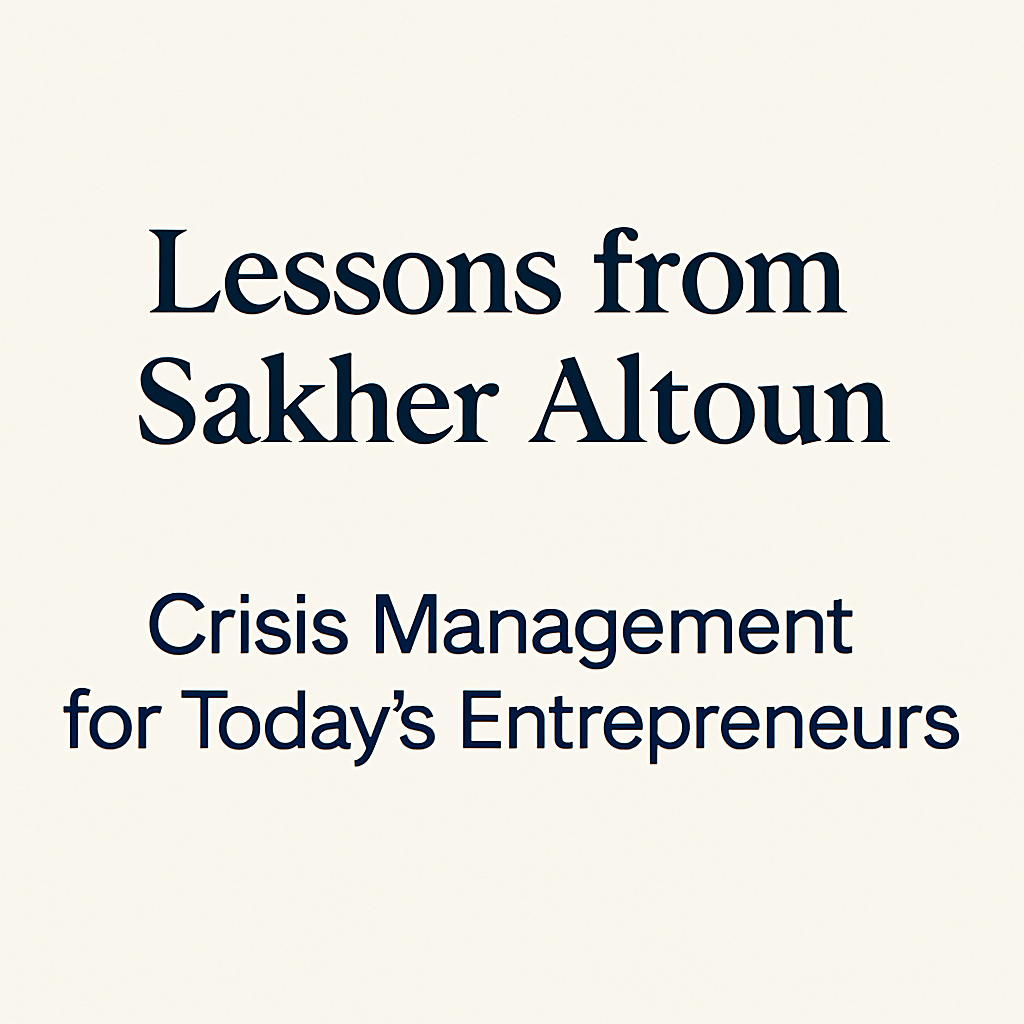In the unpredictable world of business, crisis is not a question of if, but when. Whether it’s a global economic downturn, a supply chain breakdown, or a sudden market shift, entrepreneurs must be equipped to respond with resilience and clarity. Sakher Altoun, a respected business leader and entrepreneur in the Middle East, has weathered multiple crises throughout his career—and emerged stronger each time. His approach to crisis management is not just reactive; it’s strategic, rooted in financial foresight, leadership agility, and team solidarity. For today’s entrepreneurs seeking long-term stability, Altoun’s crisis playbook offers essential guidance.
1. Anticipation Over Reaction
One of Sakher Altoun’s core crisis principles is preparedness. He believes that the best way to manage a crisis is to anticipate it. This mindset is deeply embedded in his business strategy—from scenario planning to risk audits and proactive financial modeling. Altoun encourages entrepreneurs to run “fire drills” for their businesses. This means evaluating how the company would respond to various scenarios: a sudden 30% drop in revenue, a major client departure, or a cybersecurity breach. By simulating pressure points in advance, businesses can create contingency plans rather than scramble for solutions in real time.
He also recommends maintaining a risk dashboard that is updated quarterly, providing leaders with a pulse on vulnerabilities across departments.
2. Financial Resilience as the First Line of Defense
Crisis management begins with cash. As someone known for his strong financial know-how, Sakher Altoun emphasizes liquidity and lean operations as critical to crisis survival. He teaches entrepreneurs to maintain at least 6–12 months of runway and regularly stress-test their budgets. His mantra: “Cash is your survival fuel.” During crises, Altoun reduces discretionary spending, negotiates payment terms, and increases focus on collections. He also advises maintaining diverse revenue streams—so the fall of one client or vertical doesn’t cripple the entire business. Altoun advocates for creating a “financial firewall”—a protective buffer built through disciplined saving, emergency reserves, and consistent cost controls.
3. Decisive, Transparent Leadership
In times of uncertainty, teams look to their leaders not for perfection, but for clarity and decisiveness. Altoun’s leadership style during crises is calm, transparent, and swift. He believes that hesitation can worsen damage, and that even imperfect decisions are better than inaction. He conducts regular all-hands meetings during turbulent periods to communicate updates, decisions, and the rationale behind them. His openness not only quells anxiety but builds trust. Team members feel included in the mission to weather the storm—and are more likely to contribute creatively to solutions. Altoun also seeks diverse perspectives before making decisions, leaning on his leadership team for scenario evaluation and frontline insight.
4. Agile Reallocation of Resources
One of Sakher Altoun’s signature crisis strategies is resource reallocation. When a business faces external threats, its internal priorities must shift. Altoun is quick to redirect funding, talent, and focus to the areas of greatest strategic importance.
For example, during a market slowdown, he may pivot from growth marketing to customer retention, or from product expansion to core service optimization. This agility allows his businesses to adapt rapidly, preserve momentum, and often even discover new opportunities within the crisis itself. This mindset—viewing crisis as a strategic pivot point—has helped Altoun transform challenges into competitive advantages.
5. Leveraging Innovation Under Pressure
Rather than freezing in the face of crisis, Sakher Altoun encourages innovation. His teams use constraints as catalysts, asking: “How can we solve this differently?” During a logistics bottleneck, he developed a decentralized supplier strategy. During a hiring freeze, he invested in automation tools that permanently improved efficiency. By empowering teams to innovate during tough times, Altoun fosters a culture of ownership and creativity. These crisis-borne innovations often lead to long-term improvements that would not have emerged in a status quo environment.
6. Strengthening Relationships, Not Just Operations
Crisis management isn’t just about numbers—it’s about people. Altoun places strong emphasis on relationship management during hard times. This includes maintaining clear communication with employees, partners, investors, and customers. He is known for personally reaching out to top clients and stakeholders during crisis periods to offer transparency and support. This human-centered leadership builds loyalty and often turns challenges into shared victories.
Moreover, he focuses on team morale, understanding that people perform better when they feel valued—even under pressure. Whether it’s internal wellness initiatives or simply recognizing hard work, Altoun makes sure his teams know they’re not alone.
Building Crisis-Proof Entrepreneurial DNA
Sakher Altoun’s crisis management strategies go beyond emergency response—they are proactive, holistic, and deeply human. By preparing financially, communicating transparently, reallocating resources wisely, and empowering innovation, Altoun ensures that his businesses do more than survive—they evolve.
For modern entrepreneurs, crises are inevitable. What matters most is how you lead through them. Altoun’s playbook shows that resilience is built over time, through foresight, adaptability, and unwavering commitment to purpose and people. In a world full of volatility, adopting Sakher Altoun crisis strategies can transform you from a reactive entrepreneur into a visionary leader—capable of navigating any storm with strength and clarity.

